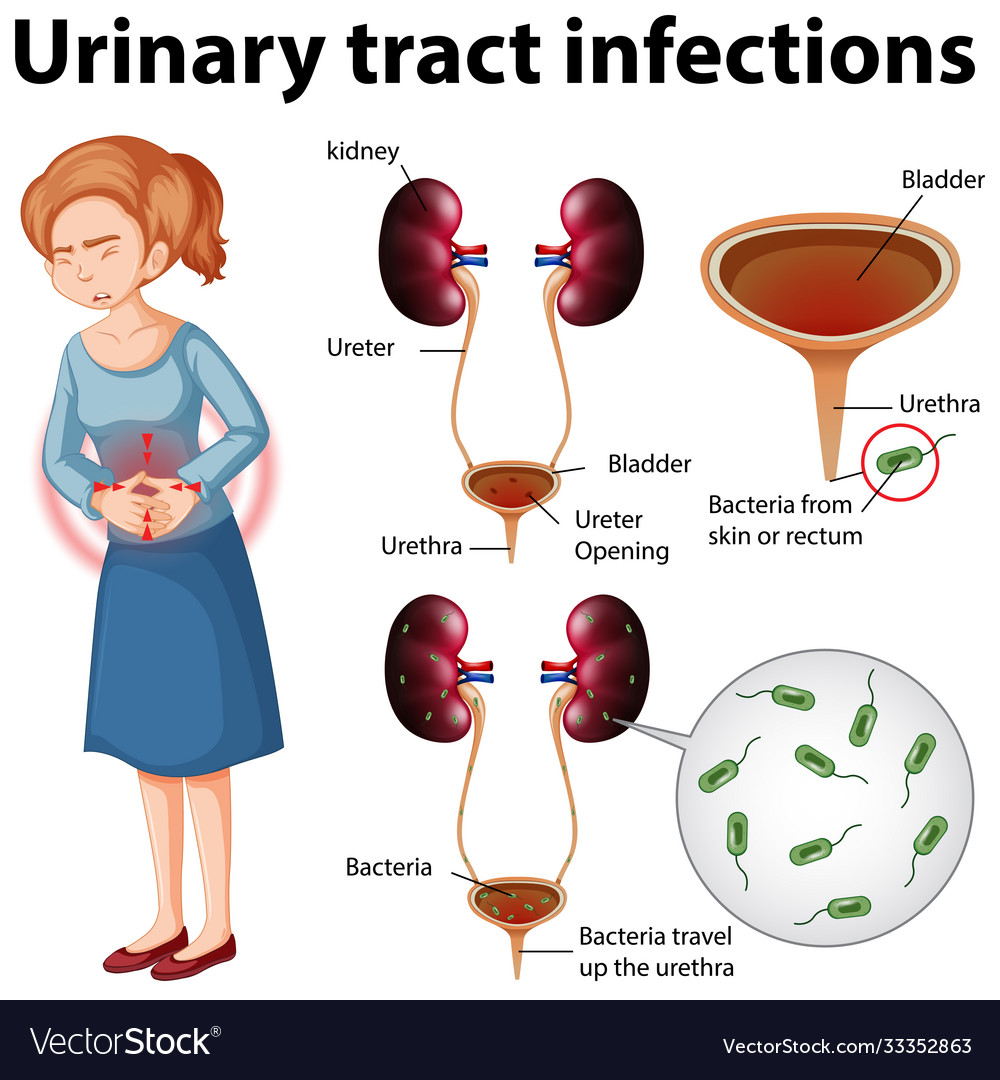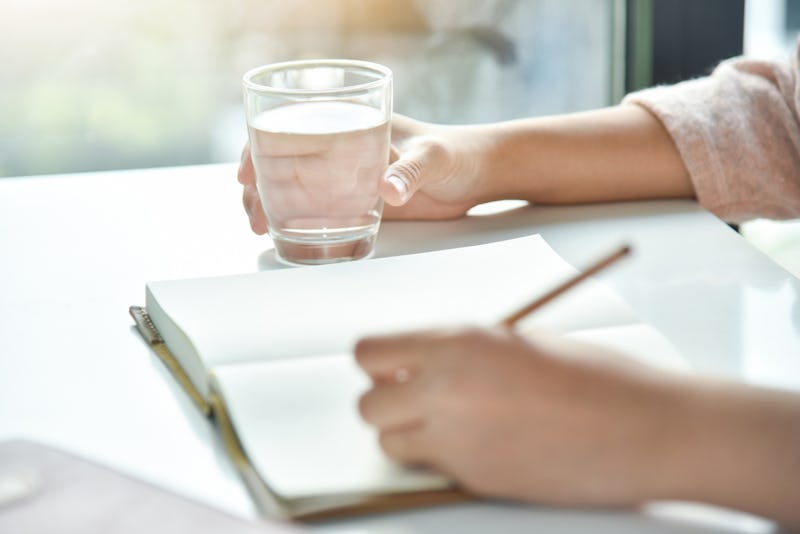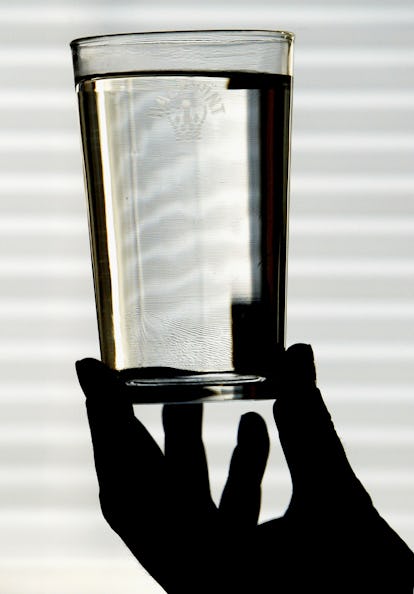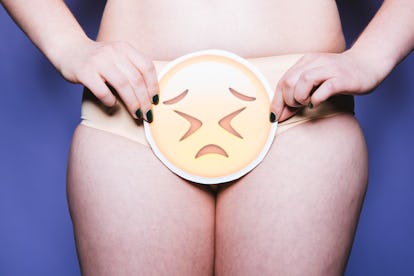
Informative illustration of urinary tract infections illustration
Share this

Urinary tract infections are serious torture. All you can think about it is how uncomfortable you feel basically all. the. time. And you need to stay near a bathroom because of that constant need-to-go feeling. So how do you prevent a UTI? According to a new study published in JAMA, you should drink more water to prevent UTIs, CNN reports. The researchers found that people with vaginas who drank an additional six cups of water than they usually do, says CNN, were 50 percent less likely to get UTIs than those who didn’t increase their water intake. That’s about four 12-ounce bottles of water, CNN reports.
According to LiveScience, the researchers said up to 60 percent of people with vaginas will develop a urinary tract infection in their lifetimes, with more than 25 percent getting more than one UTI. That’s because, says LiveScience, the urethra is shorter in people with vaginas, so it’s much easier for bacteria to travel from the rectum and the vagina to the bladder. Once a person with a vagina gets a UTI, a quarter will get another UTI within six months, and up to 75 percent will get yet another within a year, CNN reports.

“The data strongly suggest that hydration status is associated with UTI risk,” lead study author Dr. Thomas M. Hooton of the University of Miami Miller School of Medicine told Reuters in an email. Dr. Hooton suggested that people who have recurrent UTIs consider increasing their daily fluid intake “to at least two to three liters a day.” (You can do that!)

“The realistic amount of cranberry juice that can be ingested on a regular basis makes it impractical to recommend,” Dr. David Soper of the Medical University of South Carolina told CNN, “and, in addition, well-designed studies don’t show a positive preventive effect.”
According to Reuters, drinking more water has been a long-standing piece of advice to ward off UTIs, but now there’s some major research to back it up. Staying hydrated is great for your overall health, so now you have another reason to keep that water bottle handy.
What are UTIs?

UTI stands for urinary tract infection and it describes when your urinary system gets infected. While the effects of drinking water to flush out or get rid of UTIs is not proven, there has been a link between drinking over 2.2 liters of water daily and a decreased risk for UTIs.
Drinking water can help your body flush out your urinary tract before or after you have a UTI (urinary tract infection). While UTIs can often go away without you taking antibiotics, many times they do not. Depending on how severe your UTI is or what your past history with UTIs is, you may or may not want to seek medical attention for your UTI.
UTI stands for urinary tract infection. It describes when your urinary system gets infected. The infection can be present in your urethra, kidneys, or bladder. Urine is typically a bacteria-free liquid that your body produces to get rid of waste and excess water. However, when you have a UTI, your urine has bacteria in it which carries the bacteria to more parts of your body or urinary system.
UTIs are usually caused by the bacteria E.coli and though anyone can get one, they are most common in women. While there are cases of mild UTIs, most doctors recommend that you treat any type of UTI swiftly and with antibiotics. This is because there is always a risk that you could develop a bladder or kidney infection.
The symptoms of a UTI often manifest as the following:
- Pain
- Pressure in the pelvis
- Need to urinate often
- Painful urine
- Blood in the urine
- Strange urine color or odor
- Pain during sex
- Fever
- Chills
- Vomiting
If you go to the doctor because you believe that you have a UTI they will likely give you a urine test and examine the blood cells and bacteria in the urine sample, They will also culture the urine in order to find out what specific kind of bacteria is there. Most people will then receive antibiotics and their UTI symptoms will go away very soon.
If you keep getting UTIs or the medicine that the doctor gives you doesn’t work, you will most likely have to get further testing to see if there is an underlying condition that is causing the problem.
How much water should I drink to get rid of UTI?
While the effects of drinking water to flush out or get rid of UTIs is not proven, there has been a link between drinking over 2.2 liters of water daily and a decreased risk for UTIs. Not all of this water needs to come from drinking. Some can be from the water found in fruits or vegetables. One study discovered that women who drank the full 2.2 liters of water daily had a fifty percent less chance of getting UTIs.
When you have a UTI, you should drink extra water on top of the recommended amount. Doing this will make your urine less concentrated and provide a better avenue for the bacteria to leave your body. Try to avoid caffeinated or carbonated drinks during this time. They can irritate the bladder.
If you have the need to urinate, always follow it. Urinating frequently is a great way to let the infection leave your body quickly. If you are in pain at all, take a hot bath or take an over-the-counter pain medication.
Most medical sources say that while drinking water can help and prevent flushing out an infection in the urinary system, it doesn’t always. In fact, it usually does not go away without antibiotics. Left untreated, your UTI could lead to some unwanted consequences.
Some of the consequences of untreated UTIs are:
- Repeated UTIs. Often, not properly treating your UTI can lead to recurrent UTIs. This is a cause for concern if you have three or more UTIs in six months or more than four UTIs every year.
- Kidney damage. If your UTI turns into a kidney infection, this could lead to permanent kidney damage.
- Pregnancy risks. Untreated UTIs increase the risk for underweight infants and premature births.
- Narrowing of the urethra. In men, a history of repeated UTIs can lead to a narrowing of their urethra (the tube that allows itinerant to pass out of the body).
- Sepsis (blood poisoning). This is a very severe, life-threatening complication of kidney infections.
You can reduce the risks of getting UTIs by drinking water but also by doing the following:
- Drinking cranberry juice. While there is no conclusive evidence suggesting that cranberry juice prevents UTIs, there is nothing to indicate that it is harmful. On the contrary, acidity is believed to help your urinary system’s pH levels and fight the infection.
- Be careful with how you wipe. One reason women are believed to get UTIs more often than men is the proximity of the vagina and urethra to the anus. Therefore, after you urinate and produce a bowel movement, make sure to wipe yourself from front to back to avoid an infection from cross-contamination.
- Flush out bacteria after sex. Make sure to urinate directly after you have sexual intercourse. This will help your bladder flush out any bacteria it may have received from sex.
- Be selective with your products. For example, using sprays or feminine products in your genital area can irritate your body and cause infections.
- Explore birth control methods. Certain types of diaphragms and condoms can cause infection. If you find you have repeated UTIs, switching out your birth control method can be a great place to start investigating what may cause them.

Patients with urinary tract infection (UTI) are usually advised to drink six to eight glasses (1.5 to 2 liters) of water every day to flush the infection out of the urinary system.
Patients with urinary tract infection (UTI) are usually advised to drink six to eight glasses (1.5 to 2 liters) of water every day to flush the infection out of the urinary system. The best way to get the infection out of the system is by drinking liquids until the urine is clear and the stream is forceful.
- Drinking at least six tall glasses of water every day helps flush out any harmful bacteria that may be present in the bladder.
- Apart from drinking water, patients may also try to eat foods, such as watermelon, honeydew melons and oranges, which contain higher levels of water that may help flush bacteria from the urinary system.
- Although a UTI makes it hurt to pee, drinking lots of water and peeing frequently will eventually make peeing less painful and help speed recovery. Hence, focus on staying well hydrated.
- If you are dealing with a relatively mild case of UTI, it will probably get cleared within a day or two of water therapy. In addition, a person could also opt for other UTI-relieving drinks, such as sugar-free cranberry extract and other vitamin C-rich juices.
- Drinking a lot of water will help keep unwanted bacteria moving out of the body. Don’t hold in urine for long periods. A rule of thumb is to urinate every two to three hours or when you feel the urge to pee.
- However, avoid sugary drinks that may irritate the bladder. Avoid drinking beverages that include alcohol or caffeine. Drinks that contain these ingredients can irritate the bladder and trigger frequent urination.
What foods can be taken to keep the bladder healthy?
An individual with a sensitive bladder may need to know which foods may trigger urinary problems and which foods can keep their bladder healthy. A few common food options for patients with sensitive bladders are
- Bananas: Bananas are great as snacks and may also be used as toppings for cereals or in smoothies.
- Potatoes: Any type of potatoes are good for bladder health due to their high content of B vitamins in the peels.
- Nuts: Almonds, cashews and peanuts are bladder friendly and rich in protein.
- Eggs: These are rich in protein and are a good food for many bladder conditions.
- Whole grains: Quinoa, rice and oats are whole grains. They come in many varieties and are generally good for health.
- Green beans: Green beans are healthy for people with sensitive bladders.
- Winter squash: These include acorn and butternut squash.
- Lean proteins: Low-fat beef, pork, chicken, turkey and fish, especially when baked, steamed or broiled, are unlikely to bother the bladder.
- Pears: Pears are a good source of fiber and are bladder friendly.
- Coconut water: Packed with electrolytes, coconut water is a well-known remedy for many problems affecting the urinary tract. It also has mild diuretic properties, promoting urinary output.
- Pineapple juice: Acting in a similar manner to coconut water, drinking 100 percent pure pineapple juice can be a great alternative.
- Carrot juice: When consumed regularly, carrot juice can help control urinary retention. Besides being healthy, it can also help relieve the burning sensation felt while urinating.
- Probiotic diet: The good bacteria in some foods and supplements are important in maintaining the natural pH and defenses of the vagina and the bladder. Probiotic supplements are known to prevent the overgrowth of E coli, the bacteria that commonly cause UTIs. These probiotics help as well as prevent UTIs. Probiotics can be found in yogurt, curds, kefir, etc.
The benefits of drinking an optimal amount of water every day may include
- Good hydration is necessary for several functions in the body.
- It helps maintain optimal body temperature and the proper lubrication of the joints.
- It also helps flush out toxins through the urine and sweat.
- It helps prevent kidney stones.
- It helps prevent urinary tract infections.
- It helps keep mucous membranes (mouth, eyes and nose) moist.
- It helps prevent constipation.
- If the climate is hot or for an extremely active person, the body would need more water due to increased sweating.
- Drinking eight glasses (64 ounces) can help boost weight loss for the average person or someone just looking to drop a few pounds.
- It keeps the skin plump.
Eat water-rich snacks, such as melon, berries and cucumbers. Milk or herbal tea also add to your daily water intake. However, caffeinated drinks and soda are not recommended because they may increase dehydration. If you are very thirsty, you should not overdo it. Drinking too much water could lead to hyponatremia, also known as water intoxication, where sodium levels in the body become overly diluted and can lead to swelling in the brain, seizures and coma.
Ways Water Benefits the Body
Drinking Water to Lose Weight

Water Helps You Slim Down
Drinking water benefits the body in a variety of ways. Sipping cold water increases your metabolism and can help with weight loss. The body has to expend more energy to increase temperature after drinking cold H2O. This means you burn more calories. In one study, overweight young women were instructed to drink about 2 cups of cold water a half hour before breakfast, lunch, and dinner for eight weeks. By the end of the study, the women experienced weight loss, a lower body mass index, and improved body composition scores. Water also makes a great replacement for beverages that are high in sugar and calories like soft drinks and juice. Replace these beverages with water on the cool side to help your waistline.
Stay Energized with Water

H2O Fights Fatigue
Mild dehydration has negative effects on mood and energy levels. About two-thirds of the human body is comprised of water, so dehydration affects most of the body’s functions. In studies, dehydration has been associated with increased fatigue, anger, and confusion as well as mood problems and decreased vigor. You need to be well hydrated for your cells to work properly. Drinking water also helps maintain a healthy heart rate and blood pressure. You need adequate fluid to produce lymph, an important bodily fluid and component of the immune system. All systems of the body work better in a water-rich environment. Drink water steadily throughout the day to avoid dehydration. If you wait until you feel thirsty, you are probably already dehydrated. Try some lemon water if plain water is not appealing to you.

H2O Improves Your Mood
Dehydration is known to contribute to stress. Fatigue, anger, negative mood, and cognitive problems all increase when you’re dehydrated. Stay ahead of stress and sip water throughout the day. Keep a bottle of water with you at all times and drink every half hour or hour during the day. You’ll be less likely to get dehydrated and feel stressed. Remember, don’t wait until you feel thirsty to drink. Thirst occurs when you’re already dehydrated.
Work Out Better with H2O

Drink Enough Water Before Activity
Adequate hydration is a boon to workouts. Drinking water helps you work out longer and avoid muscle cramps. Water helps lubricate joints in the body. Not sure how much water you need to drink while working out? That depends on a variety of factors including your weight, how much you sweat, your activity level, and the weather. However, a good rule of thumb is that you should drink 5 to 10 ounces of water every 15 to 20 minutes while you exercise. Drink 2 to 2 1/2 cups of water every 2 hours prior to exercise to make sure you go into your workout well hydrated. If you sweat a lot, it may be a good idea to consume water that contains electrolytes (substances that the body needs to function properly, like sodium and potassium). Lemon water or water infused with other fruit flavors is also a good option to stay hydrated.

Water Fights Wrinkles
Drinking adequate water helps plump up skin cells, which minimizes the appearance of fine lines and wrinkles so you look younger. Water also supports detoxification and helps flush toxins and impurities out of the body that dull your complexion. Stay well hydrated to support good circulation and blood flow, all of which will help your skin glow. If you don’t like the taste of plain water, add a little lemon juice to make it more palatable. Vitamin C in citrus fruit is an antioxidant that fights skin-damaging free radicals and supports healthy collagen, a major component in skin. Along with drinking enough water, eat fruits and vegetables high in polyphenols and flavonoids to boost skin health. Sipping warm, vitamin C rich lemon water is believed to help you detoxify, which will help your skin glow.
Hydration Supports Digestion

Health Benefits for Your GI Tract
Water and fiber work together to keep you regular and avoid constipation. Water dilutes waste and helps eliminate toxins from the gastrointestinal tract. Water and fiber bulk up stools and make them easier to pass. Hydrate and make sure you’re getting adequate fluids every day to stay regular. If you do become dehydrated, stools will become hard, dry, and more difficult to pass. Squeeze a little lemon juice into plain water to make it more palatable. Foods and beverages containing probiotics, like kombucha, are also a boon to digestive health. One of the side effects of consuming too much sodium or fiber without enough water is bloating. Drink more water or sip peppermint tea to eliminate bloating. Be extra mindful of taking in more fluids if you develop diarrhea. Significant dehydration and loss of important electrolytes may occur if diarrhea, vomiting, or both are present. The absorption of fluid and nutrients is decreased when diarrhea occurs. Severe cases of dehydration may require IV fluid replacement.

No More Kidney Stones
More and more people are developing kidney stones. Staying well hydrated can help prevent the formation of stones. Water dilutes salts and minerals that might otherwise concentrate in the kidneys and become stones. The kidneys serve important functions in the body like maintaining water levels, regulating blood pressure, and filtering waste. Watch your sodium intake if you are concerned about kidney stones. Sodium increases calcium levels in the urine. Drinking warm lemon water when you first get up in the morning is a healthy habit that benefits not just your kidneys but also your overall health. Urine pH affects the formation of kidney stones. Acidic urine promotes the formation of some types of stones, while alkaline urine encourages the formation of different stones. Citric acid and calcium citrate are protective against the formation of kidney stones. How do you know if you are drinking enough water to take good care of your kidneys? Your urine should be a pale-yellow color. If it is darker, you may be dehydrated. If it is colorless, you may be overhydrated.
How Much Water Should You Drink?

Follow Some General Guidelines
Many people think you should drink eight 8-ounce glasses of water per day. There really is no evidence to back that up, but it’s an easy approximate amount to remember. The amount of water you should drink every day depends on a variety of factors including your weight, activity level, the weather, and how much you sweat. In reality, people meet their daily fluid requirements by drinking water and other beverages. We also get water from food that we eat. People get about 80% of their daily fluids from drinking water and other beverages. About 20% of total water comes from food. In general, an adult woman needs approximately 11 cups of total water per day from food and beverages. An adult man needs approximately 15 1/2 cups of total water per day. Caffeinated beverages have a slight diuretic effect. Of course, if you are thirsty, you need to drink more fluids. Adequate hydration aids in weight loss and has numerous other healthy benefits.






